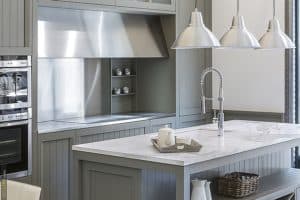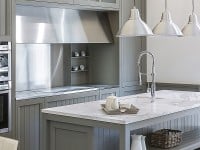Porcelain is the material of choice for bathroom fixtures, but does it make sense for countertops? While porcelain countertops might be a new idea for many, and one that takes some getting used to, they are more than just a passing trend…an interior design “flavor of the month.”

There is a well-established demand for porcelain countertops in Europe, and their popularity in the United States has grown steadily in recent years. This trend is expected to continue for the foreseeable future. Currently, the majority of porcelain countertops are imported from Spain and other European countries, but we can expect US companies to get products to the market soon.
Countertops made from porcelain are supported by a long list of pros, and you can find them below along with the cons. The tally of disadvantages is quite small. This porcelain countertop guide gives you an overview packed with quality information you can use to decide if this material warrants consideration for your bathroom or kitchen remodel.
What are Porcelain Countertops?
A dictionary definition of porcelain is that it is a “white vitrified translucent ceramic.” Now, all of the geologists out there know exactly what we’re talking about.
For the rest of us, porcelain is manufactured from a type of clay that is heavy in a mineral known as kaolinite. It should be noted that clay rich in kaolinite typically also contains minerals including feldspar, silica and mineral oxides that add to its potential strength and gives it color too.
Clay rich in kaolinite is commonly called china clay, and there’s another clue to their quality and appearance.
The Fine China Connection
Porcelain and fine china are synonymous terms, or it might be better to say these two products are made from the same material and produced in a very similar manner.
When producing porcelain slabs to be used in countertops, the kaolinite-heavy material is formed into slabs or tiles, coated with pigmented glaze and fired at high temperature to enhance strength and beauty.
Glazing pigments can be added during the fabrication of the tiles or slabs to produce an appearance similar to natural stone with the colors made to look like the veining found in marble and, to a lesser extent, granite and slate. Slabs or tiles are also manufactured with a consistent color throughout, and the variety of colors and patterns is just one of the many reasons to consider porcelain counters.
Advantages of Porcelain Countertops
This material and the countertops made from it offer benefits for appearance, practical use and durability. Here are the reasons homeowners are choosing porcelain countertops.
- Many colors are available: The countertops need to look good, first and foremost, and these do. Varied pigmentation of the raw materials creates a wide range of colors and hues, so you’ll find several that will work well with your existing décor or the theme you’re developing for a new or remodeled kitchen. Discoloration or color change is not a concern as it is with some other materials. Porcelain tiles offer the most options, but slabs in various colors are manufactured as well.
- Patterns are available: The pigmentation can be applied to give the porcelain the look of marble or other natural stone that contains veining. Pigment and patterns combine to give you incredible options.
- Several finishes are available: Matte and polished surfacing options give you choices for the finished look of your porcelain counters. Edges can be mitered in several styles to enhance the appearance.
- Large slab sizes are offered: Slabs up to 10’ x 5’ are possible, much larger than natural stone slabs, so you can cover kitchen islands with a single piece. Larger slabs mean fewer seams/grout joints to break up the run of the countertop. In turn, this speeds up installation, reduces the potential for seam issues and ultimately reduces cost.
- Porcelain is 30% stronger than granite: This fact raises eyebrows, but it is true! The surface strength of porcelain is achieved in the firing process, so the countertops resist chipping, scratches, cracks, wear and tear.
- Durability is outstanding: Due to the high strength of the material, these countertops last a long time. While the porcelain countertop price is higher than laminated counters or ceramic tile – though less than granite and other natural stones – the investment is balanced by the longevity.
- Slabs are lightweight: The first generation of porcelain countertops featured slabs 3/4″ thick, and they were heavy. The countertops now available are typically just 3/16” (5mm) thick, though other thicknesses are available. If old countertops are not being covered, then plywood is usually installed over the cabinets before the porcelain countertop is added.
- Thin slabs offer versatility: Because the slabs are so thin and lightweight, they work well as backsplashes and other wall panels, panels for the sides of cabinetry or kitchen islands and as decorative accents throughout the home.
- Porcelain countertops can be installed over existing countertops: While this isn’t done in every situation, it is an option that reduces the cost and hassle of tearing out the old material before installing the new product. This is just one of the many reasons they’re an attractive choice for bathroom, laundry room, workspace and kitchen renovation projects.
- No sealing is required: That’s right! Unlike natural stone that needs to be sealed after installation and resealed every few years to prevent several potential problems, porcelain doesn’t ever have to be sealed. The fired glazing acts as an effective barrier to moisture and provides outstanding stain resistance.
- Cleanup is easy: The glaze on the porcelain produces a waterproof surface that is very easy to clean. Warm-water cleanup or wiping with a damp cloth is all that is usually required to maintain a clean, hygienic surface. If you do use harsh chemicals such as ammonia or bleach, they likely won’t cause problems. On the other hand, natural stone, especially when the sealer is breaking down with wear, has pores that can collect water, bacteria, oil and other substances that make it unsanitary and can cause staining and discoloration.
- Porcelain is heat resistant: The countertops are fired at more than 1000 degrees Fahrenheit, so the finished product is perfect for installation where hot pots, pans or hair tools are in use. Porcelain won’t burn, smoke or emit harmful substances when subjected to heat.
- The material can be recycled: This is a pretty green product to begin with since it is made with a natural clay material. When it comes time to switch out these countertops, they can be recycled for use in other products.
Disadvantages of Porcelain Countertops
When reviewing the list of porcelain’s advantages, you see there’s not much room left for negatives regarding these versatile countertops. They can chip and crack, but it takes more force and weight to do the deed than with natural stone countertops. The price, discussed next, will turn some homeowners off, but if the cost of granite, marble, quartz or other premium materials doesn’t make you flinch, porcelain will certainly be within your budget.
Porcelain Countertop Price
We break down the cost of porcelain countertops in a separate post. In short, the installed cost of slab porcelain countertops will be $60 to $100 per square foot based on the specific material, the type of edge you have beveled into it (if any) and the complexity of the job. The more corners, cutouts and seams you have, the higher the cost per square foot is likely to be.
Who Should Consider Porcelain Countertops?
These countertops produce clean lines with sleek fit and finish. If you like the look of marble, but are scared off by its brittleness and the fact it stains rather easily, then porcelain is an excellent alternative without those negatives.
The advantages that most stand out to many homeowners include the durability of the material, how easy it is to keep clean and the fact that it is very low maintenance since it requires no sealing or refinishing. If those are among your priorities for your next countertop project, then be sure to consider porcelain countertops.
On a practical note, if you have existing countertops that are in good condition and you want to reduce installation costs, then porcelain slabs installed over them is a money-saving option to learn more about when getting bids for porcelain countertops prices.
The Importance of Finding an Experienced Contractor
Because porcelain is fairly new to the US market, make sure you find a qualified professional with experience with porcelain slabs to install your countertops. It makes sense to get at least three estimates from contractors in your area.
Discuss their experience with porcelain slab countertop installation. If possible, take a look at their work and/or speak to their references before selecting the company for the job. As is true with every countertop type, only when porcelain slab countertops are properly installed will their potential for beauty, functionality and durability be maximized.

